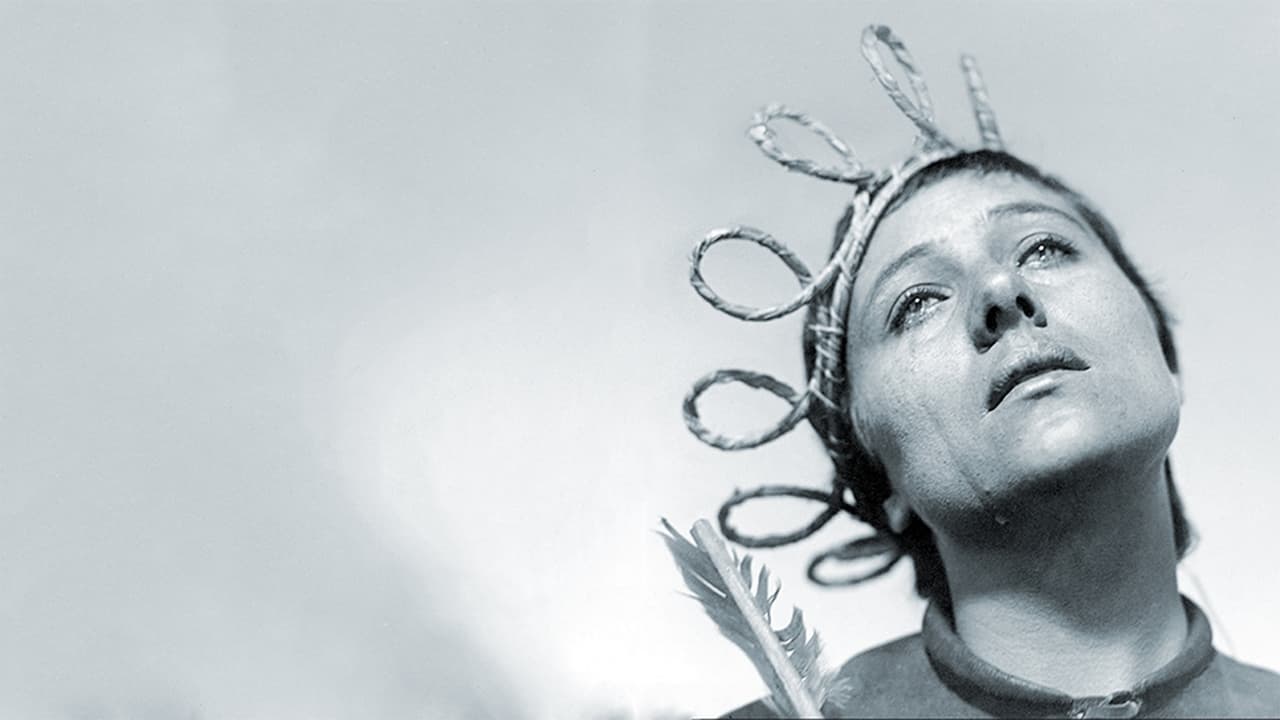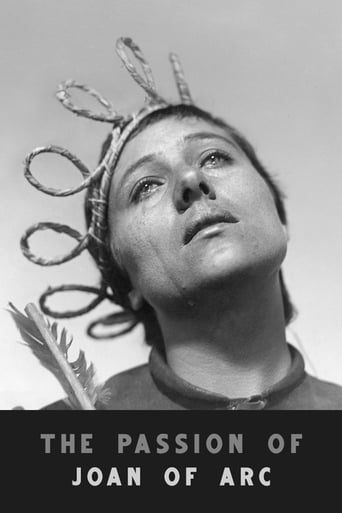

Watching The Passion of Joan of Arc without any musical score to accompany its drama really makes you see the true potential of images like never before, and the emotional impact it can have on the audience when done right. Widely considered as a cinematic landmark, this French silent classic still retains a mystical power.Set in 15th century France during the Hundred Years' War, the story of The Passion of Joan of Arc chronicles the trial of Jeanne d'Arc following her arrest. Charged with heresy, she is interrogated by French clergymen loyal to the English who attempt to force her to recant her claims of holy visions, and ultimately execute her when she refuses.Written & directed by Carl Theodor Dreyer, the film employs a number of filmmaking techniques that were unconventional for its time and the script itself is adapted from the original transcripts of Joan's infamous trial. Dreyer narrates the plot with minimal dialogues, utilising the intertitles only when it's a necessity, and sustains our interest with inventive camerawork.By employing extreme close-ups of the characters' faces shot from low angles, the camera manages to properly convey the mood of the ongoing trial while the minute details & varying expressions on characters' faces only adds to the unfolding drama. Editing provides a steady pace to its set of events though there are times when the scenes feel somewhat repetitive.Coming to the performances, The Passion of Joan of Arc is Maria Falconetti's show all the way. Playing the role of Jeanne d'Arc from inside out, Falconetti delivers what may as well be the pinnacle of expressionistic acting, for she illustrates Joan's inner turmoil with such authenticity as if she herself was on brink of emotional collapse. It is a truly unforgettable performance that's finely supported by the rest of the cast.On an overall scale, The Passion of Joan of Arc is a powerfully moving & thoroughly compelling picture that uses the human face as its storytelling device and succeeds amazingly well. Despite being 90 years old, it packs a strength that's highly evident when you are watching it while Maria Falconetti's emotionally resonant performance is a stuff of legends in itself. The absence of score may make its 82 minutes runtime a tough sit for some but this silent classic is every bit worthy of its legendary status.
... View MoreExpressive eyes, tense lips, closed mouth, and the stare that just looks ahead and farther away from the desolate mundanity to settle to the glorious chants of heaven, Maria Falconetti easily and without a doubt gives one of the best performances found in the era of silent film. The Passion of Joan of Arc is one of the most influential French films of its time, and still continues to inspire today. It focuses on the last days of Joan of Arc's life, and dives right into her trial immediately after being captured and accused of being a heretic.Being banned in multiple countries as it was controversial during their time, this film is a strong testament on how far human nature can go, how humanity can easily shift towards "sides" depending on number. Likewise, this film is a spiritual experience that explores the idea of faith, and how much sacrifice one can put in just trying to protect or restore one's beliefs. It doesn't show Joan of Arc prior to her days at the trial. It doesn't show her victories, her accomplishments, nor her success in leading the English out of France. Instead, it completely strips her to a character undergoing through a strong crisis as she goes through a questioning of fate that ultimately decides life or death.I have seen the version with music in it (and am currently interested in viewing the completely silent one), and it is truly transcendent. Considering the fact that it was done way back in 1928 impressed me, and the metaphysical journey that this may bring to the viewer—religious or not, may take one to utmost beauty, even up to the brink of tears. Personally, the psychological power of the close-up made me sympathize much more with Joan, and the fact that Falconetti only acted once in her entire life is just stunning. Even without words, Falconetti is still able to display a performance of outright vulnerability while still being confident and at one with God.As per usual with silent films, I still did have some problems with this, and these are more personal ones that I found affecting my entertainment value of the film. As great as this film was, I found this one to be a difficult watch not just because of it's bleak subject matter, but also because of the way it was shot. I do understand the power of the close-up and I actually praised it a while earlier, but for me, using it for most of the film's shots was a mistake. There were barely any background pans or shots to establish the character's placement, so it's quite difficult to follow the location of each, making it sometimes a burden to watch. The wooden transitions between each scene also made everything jarring and dizzying. It's easy enough to forgive the film as it was almost made a hundred years ago, but I found myself occasionally distracted enough to pause the film, which isn't a good thing.In all, The Passion of Joan of Arc is easily commendable because of the technological advancement in film it made during that time, but the low rewatchability and abusive use of close-ups make this a difficult recommendation. Maria Falconetti's passionate performance may still make this film worthwhile, and the influence that this had on preceding films stretches out over many generations, but basing this on entertainment value, this film doesn't really hit the mark and, at times, feels outdated.
... View MoreA movie mostly made of close-ups of raw, naked faces-- it is astonishing how much a filmmaker can achieve with so little, but The Passion of Joan of Arc is one of the finest films of the last century. To repeat why would be a waste of time, because you have likely read review after review about Falconetti's marvelous acting, the camera angles, the lighting, everything.Forget modern religious propaganda like The Passion of the Christ or the God's Not Dead series-- THIS is what a religious movie should be like! In all of Gibson's gore, there is not a moment like Joan at the threshold of the torture chamber, terrified, wavering, but resilient and trusting in her God. This isn't about a victim complex meant to paint the rest of the world as evil and the sympathetic viewer as morally superior to everyone else; it is about what it means to have faith in the face of persecution, persecution not by straw-man atheists, but by corrupt church officials more interested in earthly affairs than divine love. We never see God anywhere but in Joan's eyes, and even then, sometimes she is searching, fearing she is frightened and alone. And Joan's uncertainty but ultimate triumph is part of why this is one of the most emotionally involving films of all time.
... View MoreFrom director Carl Theodor Dreyer (Vampyr, Ordet, Gertrud), this is a Danish silent film I was really looking forward to watching because of all the critical acclaim I knew it had, including of course it's placing in the 100 Movies You Must See Before You Die book. Based on the real authentic records of the historic trial, this film depicts the last few days of Jeanne d'Arc, better known as Joan of Arc (Maria Renée Falconetti), on trial for the crime of heresy, because she believed it was her mission from God to support King Charles VII and fight or lead in the Hundred Years War, the battle between France and England. In court she is questioned by Bishop Pierre Cauchon (Eugène Silvain) and supported by some as a true saint, and she remains dedicated to her beliefs, and in her cell, while judges try to find evidence to convict her, she is interrogated by priests and attempts to convince her to change her views fail. These attempts include a false letter from the king, and she is denied a Mass, Jeanne does become visibly emotional during trial, with those speaking ill of her strong religious beliefs and the antagonism, she also faints at the sight of the torture chamber, but she does not give in to any demands of a change to her statements. However Jeanne is threatened with the penalty of being burned at the stake, and she finally breaks, allowing a priest to have her sign a document of confession, and she is given communion, but then again Jeanne recants and in the end as punishment is publicly executed in the courtyard at Rouen castle, burning at the stake while a crowd protests. Also starring André Berley as Jean d'Estivet, Maurice Schutz as Nicolas Loyseleur, Antonin Artaud as Jean Massieu, Michel Simon as Jean Lemaître, Jean d'Yd as Guillaume Evrard, Louis Ravet as Jean Beaupère and Gilbert Dalleu as Jean Lemaître. Falconetti gives an extraordinary performance as the title character, you can see all the emotions in her face with the many closeups, it is the only role she ever had as well, this film goes to show that not all films need sound or dialogue when you have a magnificent leading performer, and there are some really good camera angles, zooms, tilts and pans that create the intensity, this really is a compelling and must see classic silent drama. Very good!
... View More